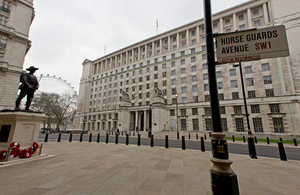Pay boost for millions as National Minimum and Living Wage rates go up from today
- Around 2.5 million UK workers will receive a pay rise, as the National Minimum Wage and National Living Wage increase today
- £1,000 a year pay rise for full time workers following the largest ever uplift to the National Living Wage for workers aged 23 and over
- Business Secretary Kwasi Kwarteng: “While no government can control the global factors pushing up the cost of everyday essentials, we will absolutely act wherever we can to mitigate rising costs.”
Millions of UK workers will receive a pay rise from today (Friday 1 April 2022), as the National Minimum Wage and National Living Wage rise comes into effect.
The uplift in wages, which will benefit around 2.5 million people, includes the largest ever increase to the National Living Wage. It will put £1,000 a year more into full-time workers’ pay packets, helping to ease cost of living pressures.
With today’s rise, the yearly earnings of a full-time worker on the National Living Wage will have increased by over £5,000 since the introduction of the National Living Wage by the government in April 2016.
As a direct result of government action, the current number of employees on the payroll is over 600,000 more than pre-pandemic levels – and unemployment has fallen to 3.9%.
Business Secretary Kwasi Kwarteng said:
We have never been more determined to make work pay, and by providing the biggest cash increase ever to the National Living Wage from today, we are giving a boost to millions of UK workers.
While no government can control the global factors pushing up the cost of everyday essentials, we will absolutely act wherever we can to mitigate rising costs.
With more employees on the payroll than ever before, this government will continue to stand up for workers.
Today’s uplift will particularly benefit workers in sectors such as retail, hospitality and cleaning and maintenance. Apprentices will also get a large 11.9% increase to their minimum hourly pay, with 21 to 22 year-olds seeing an immediate 9.8% rise. The National Living Wage, the minimum wage for over 23 year-olds, will now move up to £9.50 an hour.
Last year, the age threshold for the rate moved from age 25 to 23, meaning that more young workers are now eligible for a higher wage.
The new National Minimum Wage and National Living Wage rates are both statutory minimums, and businesses are encouraged to pay workers above these whenever they can afford to do so.
Recent studies show significant benefits for employers who pay their staff higher wages, which includes higher job retention and staff productivity.
In full, the increases from 1 April 2022 are:
| Rate | From April 2022 | Current rate (April 2021 to March 2022 | Increase |
|---|---|---|---|
| National Living Wage | £9.50 | £8.91 | 6.6% |
| 21 to 22 year old rate | £9.18 | £8.36 | 9.8% |
| 18 to 20 year old rate | £6.83 | £6.56 | 4.1% |
| 16 to 17 year old rate | £4.81 | £4.30 | 4.1% |
| Apprentice rate | £4.81 | £4.30 | 11.9% |
| Accommodation offset | £8.70 | £8.36 | 4.1% |
With the rates going up from today, workers across the UK are being urged to check they are being paid properly. This can be done by visiting the Check Your Pay site, which also offers advice on what to do if you are being underpaid.
The government also today announced it will be launching a communications campaign in the coming weeks to help increase understanding among minimum and living wage earners around the wages they are legally entitled to, as well as the steps they can take if they are concerned they are being underpaid.
Record increases in global gas prices this year saw the Energy Price Cap, set by the independent regulator Ofgem, rise by 54%. While a worrying time for households, the price cap continues to insulate millions of households from high wholesale gas prices.
Today’s uplift comes alongside further government measures worth over £9.1 billion to support people across the UK with rising energy bills, with the majority of households receiving £350 in total. This will help over 28 million households affected by the large spike in global energy prices, protecting them from half of the average forecast bill rise.
The package includes a £150 rebate in Council Tax bills for all households in Bands A to D in England – 80% of households – with payments being made from today (Friday 1 April 2022), and a £200 reduction in energy bills for all households from October 2022 through the Energy Bills Support Scheme.
This contributes to wider government support to ease cost of living pressures worth £22 billion next financial year as well as government plans to drive £6 billion into making homes more energy efficient over the next ten years, which is vital to keeping household energy costs down.
The government is also announcing further help for low-income households to meet energy costs with the publication of consultation responses on the extension of the Warm Homes Discount and Energy Company Obligation schemes.
The Warm Homes Discount scheme is being extended until 2025/2026 and expanded to reduce the energy costs of around £3 million low-income and vulnerable households every year, while the Energy Company Obligation scheme will see £1 billion annual funding until 2026 to help upgrade energy efficiency measures in 450,000 homes, cutting an average of £300 off energy bills.
Going even further to ease the cost of living, last week as part of the Spring Statement, the Chancellor Rishi Sunak announced a new Tax Plan, including cuts to fuel duty by 5p per litre, and that energy efficiency measures can be installed in homes VAT free for the first time ever.
The Chancellor Rishi Sunak said:
This historic increase will mean a pay rise for millions of hard-working Brits – with an average full-time worker pocketing an extra £1,000 a year.
We’re doing everything we can to ensure people keep more of what they earn in these challenging times, with a new Tax Plan that delivers tax cuts for nearly 30 million people as well as £22 billion to help with the cost of living.
Bryan Sanderson Chair of the Low Pay Commission said:
The Business Secretary’s strong support is especially welcome at this difficult time. Workers on the minimum wage; care for our elderly and sick, harvest and deliver our food, and do a multitude of other tasks which help us all.
Many public sector workers including for example teaching assistants will also shortly be included. They all deserve to be properly remunerated and respected as key members of our society.
The Low Pay Commission met with around 100 representative bodies last year before making its recommendations. We are frequently their main sometimes even their only advocates. With government support we will continue to try to ensure that they do not suffer from the neglect which was so often characteristic of the past.
The new rates – announced at the Chancellor’s Spending Review 2021 – were recommended by the independent body the Low Pay Commission, following extensive consultation.
The government is committed to the target of the NLW reaching two-thirds of median earnings by 2024, and this increase means we are on track to meet this.
Last week we published this year’s remit to the Low Pay Commission, asking them to make recommendations later this year for minimum wage rates to apply from April 2023.
Examples on how paying a higher wage promotes good productivity includes: Riley and Bondibene, ‘Raising the Standard: Minimum Wages and Firm Productivity’, 2017
The workers most likely to benefit from the uplift is outlined in the government’s impact assessment published alongside the regulations.
Other changes to workers’ rights come into force today, including a certification officer levy for trade unions. Please find out more: government confirms plans to modernise trade union regulator.
Workers across the UK are entitled to the minimum wage, including Ukrainian refugees. For information on NMW entitlement please see: The National Minimum Wage and Living Wage.
We encourage all employees to check their pay, particularly if you feel you are being paid incorrectly. For more details on the check your pay campaign, please see: Check Your Pay site.
The regional breakdown for people in the UK on the National Living Wage or National Minimum Wage are:
| Region | Coverage of NLW and NMW rates |
|---|---|
| North east | 113,000 |
| North west | 295,000 |
| Yorkshire and Humber | 236,000 |
| East Midlands | 214,000 |
| West Midlands | 256,000 |
| South west | 219,000 |
| East | 209,000 |
| London | 212,000 |
| South east | 284,000 |
| Wales | 122,000 |
| Scotland | 174,000 |
| Northern Ireland | 138,000 |


